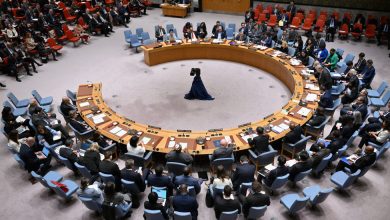Russian Troops Will Stay to Finish Job in Kazakhstan, Putin Says

MOSCOW —President Vladimir V. Putin of Russia said on Monday that recent unrest in Kazakhstan had been caused by “destructive internal and external forces” and that more than 2,000 troops his country had sent as “peacekeepers” would leave only once their mission was complete.
Mr. Putinsaid the troops would remain “for a limited time period.” But he did not give any deadline for a withdrawal, saying that they would stay as long as President Kassym-Jomart Tokayev of Kazakhstan “considers it necessary,” raising the possibility they could be in the country indefinitely.
Mr. Putin’s comments, made at a meeting of the Collective Security Treaty Organization,a body equivalent to NATO that includes six countries from the former Soviet Union, were his first since unrest engulfed Kazakhstan last week, with widespread protests over rising gas prices that began peacefully and then turned violent.
The Russian president said the unrest was indicative of foreign attempts to intervene in a region the Kremlin sees as its sphere of influence, and compared recent events to the protests in Ukraine that led to the ouster of the country’s pro-Russian president in 2014. Those protests also helped precipitate Russia’s annexation of Crimea and invasion of the Donbas region in eastern Ukraine that year.
Mr. Putin said that the Collective Security Treaty Organization, widely seen as Russian-dominated, would not allow any “color revolutions,” a term that has been used for the pro-democracy movements that swept many countries of the former Soviet Union.
“Elements of force and information support of protests” reminiscent of the Ukraine protests, which the Kremlin has long maintained were organized by anti-Russian foreign powers,“were actively used, and well-organized and well-controlled groups of militants were also used,” Mr. Putin said. He added that people “apparently trained in terrorist camps abroad” had been among the rioters.
At least 5,800 people have been detained and more than 2,000 injured after several days of violence last week in Kazakhstan.
Mr. Tokayev, the country’s president, told the same alliance meeting that he had weathered “an attempted coup d’état,” one in which “armed militants” had sought to use protests as a pretext.
“The main goal was obvious: the undermining of the constitutional order, the destruction of government institutions and the seizure of power,” he said.
It is difficult to assess the situation inside Kazakhstan, which has been largely shut off from the outside world, and neither Mr. Putin nor Mr. Tokayev provided evidence for their assertions.
The comments came as American and Russian diplomats gathered in Geneva in the hopes of negotiating a drawdown of the 100,000 troops the Kremlin has positioned on the border with Ukraine in recent months.
Understand the Protests in Kazakhstan
What’s happening? Protests in Kazakhstan incited by anger over surging fuel prices have intensified into deadly clashes over the future direction of the autocratic Central Asian country. Here’s what to know about how the protests started and why they matter:
What led to the protests? The protests began when the government lifted price caps for liquefied petroleum gas, a low-carbon fuel that many Kazakhs use to power their cars. But the frustration among the people runs deep in regards to social and economic disparities.
What do the protesters want? The demands of the demonstrators have expanded in scope from lower fuel prices to a broader political liberalization by seeking to oust the autocratic forces that have ruled Kazakhstan without any substantial opposition since 1991.
Why does the unrest matter outside this region? Until now, the oil-rich country has been regarded as a pillar of political and economic stability in an unstable region. The protests are also significant for Vladimir Putin, who views Kazakhstan as part of Russia’s sphere of influence.
How has the government responded? President Kassym-Jomart Tokayev has called the protesters “a band of terrorists,” declared Kazakhstan under attack and asked the Russian-led military alliance to intervene. Officials have instituted a state of emergency and shut off internet access.
Mr. Putin said Russia’s decision to send troops to the “brotherly Kazakh people” — the first time the 20-year-old Collective Security Treaty Organization had activated its mutual defense clause — was “extremely timely and absolutely legitimate.”
Mr. Tokayev’s decision to invite foreign troops to help quell the unrest was a sign of his domestic weakness and internal power struggles, many analysts said. It is likely to pull the resource-rich Central Asian nation further into Russia’s embrace, and make Mr. Tokayev reliant on Moscow for his continued power.
Kazakh officials said on Sunday that order had been restored and that the foreign troops would “probably” be gone by the following week.
But Russia has a record of sending “peacekeepers” who do not leave. Troops it sent three decades ago to the breakaway region of Moldova and the Abkhazia region of Georgia remain there.




